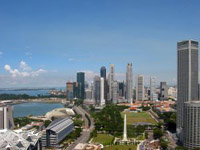Singapore is a modernized and highly developed nation. Expats will find that Singapore’s healthcare system is among the best performing systems in the world. There are private and public health services available and both are known to provide high quality treatments.
However due to the country’s dense population, communicable health conditions get passed around quite easily. These include minor problems such as the flu and colds. Singapore also faces the problem of air pollution, which in turn could trigger and aggravate respiratory conditions.Like European countries, Singapore also has an increasing number of cases of obesity, cardiovascular disease and diabetes. These are not likely to affect expats directly, but it’s always advisable to have a good health insurance plan. Those thinking about moving to Singapore should be aware of certain health risks that are specific to this Southeast Asian country.
Respiratory conditions
Singapore’s streets witness a lot of traffic due to the large population. Pollution also arises from the heavy industrial manufacturing and logging that takes place in the neighboring countries of Malaysia and Indonesia. The period between June and September sees a great deal of pollution due to fires in Indonesia. The high levels of smoke and smog can lead to health problems such as breathing difficulties, allergies, sinus infections and asthma. To protect against these problems, it is advisable to restrict your outdoor exposure on days when the pollution levels are high. Masks can also be used to prevent breathing in polluted air while commuting. The Singapore government frequently issues updates and health advisories regarding pollution levels.
Hand, Foot and Mouth Disease
This viral disease has become more common in Singapore in recent years. It particularly affects young children and triggers symptoms such as rashes on the hands, feet and face, scabs and blisters. The virus is present in the saliva and mucus of an affected individuals and spreads through touch. Proper hygiene helps to reduce the risk of this disease. In case of a breakout, children should be kept away from daycare or other such places as the condition spreads rapidly in small communities.
Mosquito-borne diseases
Dengue fever and chikungunya virus can occur at any time of the year in Singapore. Dengue fever in particular has begun to occur more frequently and the year 2013 saw a rise in the number of cases. It can cause nausea, fever, headache, joint pain and muscle aches. Quick medical treatment is essential in case an infection is detected. The best way to protect against such diseases is to prevent mosquito bites.
Type 2 Diabetes
Almost 10 percent of the adult population of Singapore has diabetes. While this is mainly associated with a gene that is usually present in Malays and Indians, a few dietary and lifestyle measures do help to reduce the risk of developing the condition. Type 2 diabetes can be prevented to some extent by not smoking, restricting daily sugar intake, avoiding processed foods and exercising regularly.
Common flu
Common flu or Influenza is common in Singapore since the levels of human traffic passing through the city-state are so high. Singapore also has a warm, moist climate that enables viruses to thrive and hence infections can spread more easily. The most effective way to protect against the common flu is to maintain good hygiene by washing the hands regularly or using hand sanitizers when outdoors.
Dehydration
Singapore’s hot and humid climate can be overwhelming for those that are used to cooler weather. Dehydration can occur if the body is not kept hydrated. Sunburn can also be a problem for those who need to spend time outdoors. Using a sunblock can help to protect the skin.
Expats who are moving to Singapore can inquire from their doctor if any preventive measures or vaccinations are necessary. It’s also helpful to be aware of the healthcare facilities available in Singapore and the extent of coverage your health insurance provides. Permanent residents of Singapore are eligible for the mandatory national insurance scheme, MediSave. Expats with work permits can arrange for healthcare on their own or through their employers. Local and international health insurance companies are present in Singapore and the costs depend on the type of health package. Choose a package that is best suited to your requirements.

